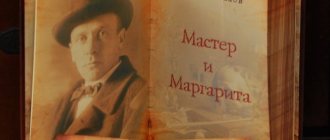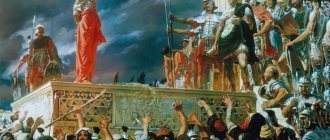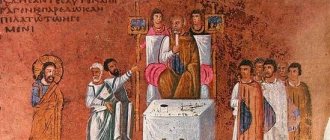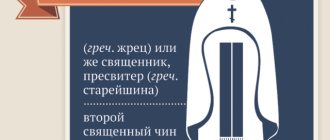Pontius Pilate is one of the key characters in “The Master and Margarita” by Mikhail Afanasyevich Bulgakov. The result of the actions of this hero was the death of the philosopher-preacher Yeshua Ha-Nozri, which ultimately served as the cause of the centuries-long torment of the fifth procurator of Judea. It is noteworthy that the image of Pontius Pilate in the novel not only has a real historical prototype, but also almost completely corresponds to it.
The character of the procurator
According to most historical sources, Pontius Pilate was born in the Gaulish city of Lugudun and came from the equestrian class. In 26 AD e. he became the ruler of Judea, replacing Valerius Gratus. The Jewish historian Josephus calls Pilate hegemon, but he bore, in fact, two titles at once:
- Prefect of the Praetorium . This position was appointed by the emperor and meant primarily the post of commander of the Praetorian Guard. If the person who occupied it was a horseman, he was automatically included in the Senate. In addition, the prefect had the right to engage in judicial proceedings - in this case, the decision he made in a particular case was recognized as final and not subject to appeal.
- Procurator . In ancient Rome, procurators were the name given to high-ranking officials in charge of managing provincial cities. They were responsible for both the general well-being of the residents and financial matters.
If you believe the words of his contemporaries, Pontius was not a decent person and was not famous for justice - on the contrary, he was corrupt, dishonest and absolutely unprincipled. For example, Philo of Alexandria argued that the prefect was responsible for many unjust executions committed without any reason, and King Herod complained to Caligula about his unbearable cruelty . However, it is worth considering that the assessment of the Jews was not impartial - they were sensitive to the appointment of the new ruler and reacted extremely sharply to any of his actions.
For example, when Pilate ordered banners with his own image to be brought into Jerusalem, the inhabitants surrounded his residence and besieged it for five days, demanding the removal of pagan symbols from the shrine. In the end, the procurator relented, but a persistent hostility towards both the Jews and their religious customs settled in his soul. A little later, history repeated itself, but this time the object of contention was the water supply system, the construction of which the prefect intended to carry out at the expense of the temple treasury, which both representatives of the Sanhedrin and the townspeople themselves sharply rebelled against.
Conclusion
Revealing the image of Pontius Pilate in the novel “The Master and Margarita,” Mikhail Afanasyevich Bulgakov raises the problem of responsibility for one’s actions and talks about the importance of making the right decision.
Every person is free to act according to his conscience, putting aside doubts and petty fears. If a wrong decision is made, the sinner faces severe punishment. There is a way out of such situations - this is awareness of your mistake and sincere repentance. Even a person like the fifth procurator of Judea, Pontius Pilate, can be forgiven if he repents. In this case, it does not matter at all what exactly the person did. All that matters is getting on the right path. The author leads us to this conclusion. Characteristics of the image of Pontius Pilate can be useful when writing essays and for preparing literature lessons.
Description in the work
Bulgakov in The Master and Margarita describes Pontius Pilate as a gloomy and stern man who hates the aroma of rose oil and suffers from severe headaches - hemicrania, or migraines. By the time he meets the wandering philosopher Yeshua Ha-Nozri, whose case the Sanhedrin sends for consideration by the procurator, the latter is exhausted by illness to such an extent that he begins to think about suicide. In addition, the hegemon looks broken, lonely and deeply unhappy. The only living creature to which he is truly attached is a dog named Bunga, whom the prefect is accustomed to calling in difficult moments.
Communication with Ha-Notsri makes a strong impression on Pilate - to such an extent that the procurator even intends to take the philosopher to his own residence, located in Caesarea Stratonova, in order to be able to talk with him at any time. However, having learned that Yeshua is accused of a state crime, the hegemon does not dare to go against Caesar and approves the death sentence imposed by the Sanhedrin.
True, Pontius subsequently tries to intercede with the high priest on behalf of the one whom he himself calls a harmless holy fool, but his words have no effect - the religious authority of Judea is unshakable in its intention to get rid of the preacher. As a result, instead of Ga-Notsri, the rebel and murderer Var-Rabban is released, while the philosopher accepts death on the cross.
Character character
Pontius Pilate is one of the most striking and extraordinary heroes of the novel. The fifth procurator of Judea lives on his own estate in Caesarea and enjoys a privileged position in society as the governor of the Roman emperor Tiberius. Due to his status, as well as military merits, the hegemon (ruler) is very rich and powerful.
By origin, Pilate is the son of an astrologer king and a miller’s daughter. In his youth, he served as a tribune (commander) of the legion and was a brave warrior; he considered cowardice one of the most terrible human vices. However, over time, his courage, as well as his faith in people, dried up. Having taken the post of procurator, he took control of the army and began to decide the destinies of people. Over time, the ruler became more and more cruel, more and more disappointed in people. Pilate himself told Yeshua that people call him a ferocious monster, and he agrees with them. The author characterizes the hero as a cruel tyrant who knows no compassion.
Arrogant, hot-tempered and at the same time smart and insightful, the hegemon is bored in his service, but values it very much. That's all he has. The character is endlessly lonely. He has an unpleasant appearance and health damaged by military service: he suffers from severe headaches and thinks about death. And only a faithful friend, the dog Bang, supports the ruler in such moments.
Motives for actions
The approval of the death sentence by the Sanhedrin was in fact not inevitable - like any person, Pilate had a choice and could insist that the wandering philosopher be released. Moreover, it is not a fact that this would have damaged the reputation of the hegemon - if you look at it, the release of Bar-Rabban, who was openly inciting the people against Roman power, could turn out to be a more serious offense in the eyes of the supreme ruler than the simple removal of Yeshua from Judea. However, the procurator could have at least two reasons for such an act:
- Reluctance to aggravate the conflict with the Sanhedrin and the population. Understanding very well how strong the hatred of the people is and how great the influence of local authorities on people, Pilate was aware that open confrontation could result in the most disastrous consequences for him. It is unlikely that the ruler would take the side of the prefect if there was a threat of a real riot; rather, he would agree to his resignation or even execution for the sake of general peace.
- Ordinary fear. As Yeshua quite rightly noted, cowardice is one of the most terrible vices of a person. The procurator was afraid that the Roman authorities, like the high priest Caiaphas, would see in the philosopher’s sermons a more serious threat than in the actions of Bar-Rabban, and would suspect that the hegemon shared the thoughts of Ha-Nozri. And this meant not only the end of Pilate’s career, but also the death penalty for himself.
True, if you believe the church historian Eusebius of Caesarea, the prefect was ultimately removed from his post due to denunciation by the inhabitants of Samaria, after which he was sent into exile, where for some reason he committed suicide. According to another version, Pilate was executed by the Roman Emperor Nero.
Pontius Pilate
- What is the novel about? — A novel about Pontius Pilate. <…> Woland laughed thunderously, but did not frighten anyone and did not surprise anyone with his laughter. <… contentScore=”29341″> - What about what? About whom? - Woland spoke, stopping laughing. - Now? It's amazing! And you couldn't find another topic?
In a white cloak with a bloody lining and a shuffling cavalry gait, early in the morning of the fourteenth day of the spring month of Nisan, the procurator of Judea, Pontius Pilate, came out into the covered colonnade between the two wings of the palace of Herod the Great.
Pontius Pilate is one of the central characters in the “Yershalaim chapters” of the novel “The Master and Margarita”, the Roman procurator (governor) of Judea, under whom Yeshua Ha-Nozri (the prototype of Jesus Christ) was executed. The creation of the image of Pontius Pilate was preceded by Bulgakov’s study of both theological and historical sources, among which a special place was occupied by the works of the French philosopher Renan “The Life of Jesus” and the English writer Farrar “The Life of Jesus Christ”.
The number of works of fiction read by Mikhail Afanasyevich may have included Anatole France’s story “The Procurator of Judea,” the hero of which, unlike the character of the Master, “absolutely does not remember either Jesus Christ himself or his execution.” Bulgakov's Pilate, on the contrary, cannot forget her. When he hears from the head of his secret service, Afranius, that Yeshua, before his death, called cowardice the most important human vice, the procurator’s voice becomes hoarse. Reading the words of Ha-Nozri, “... the greatest vice... cowardice,” written by Matthew Levi on parchment, Pontius Pilate shudders.
Pontius Pilate in Bulgakov's novel is a complex, dramatic character. Yeshua in the novel says: “All power is violence against people... the time will come when there will be no power either of Caesar or any other power. Man will move into the kingdom of truth and justice, where no power will be needed at all.” Because of fear of denunciation, fear of ruining his career, Pilate confirms the sentence, and Yeshua is executed.
The Gospel of Matthew says that Pilate, wanting to emphasize his disagreement with the accusation, washed his hands (“took water and washed his hands before the people, and said: I am innocent of the blood of this righteous one; see you”). This was a Jewish rite prescribed in Deuteronomy, symbolizing non-participation in the blood of the murdered. This ritual was alien to the Roman Pilate, and Bulgakov, sensitive to historical details, replaced it with a simple gesture reminiscent of ablution (“he rubbed his hands, as if washing them”).
Pontius Pilate commits evil under the pressure of circumstances that he could not resist, and then throughout his life and beyond - for “twelve thousand moons” - he repents of it. The colors of Pilate’s clothes are symbolic: he came out “into the covered colonnade between the two wings of the palace of Herod the Great” “in a white cloak with bloody lining.” The very combination of white (the color of purity and innocence) and blood red is perceived as a tragic omen. But the procurator is trying to at least partially atone for his guilt before the innocent wandering philosopher. By order of Pontius Pilate, Yeshua's suffering was shortened: he was pierced with a spear. Following the secret order of the procurator, Judas is killed.
At the request of the master and Margarita, Pontius Pilate in the last chapter of the novel receives liberation and forgiveness, and together with Yeshua, talking, he leaves along the lunar road. The idea of forgiveness and mercy associated with the image of Pilate is one of the central ones in the novel “The Master and Margarita”, and it ends the last - 32nd chapter of the novel: “This hero went into the abyss, left irrevocably, the son of the king, forgiven on Sunday night -stargazer, cruel fifth procurator of Judea, horseman Pontius Pilate.”
Prototype
Pontius Pilate is a real historical figure. He was the Roman governor (prefect) in Judea from 26 to 36. In 1961, during excavations at Caesarea, his former residence in Judea, archaeologists found a slab with a Latin inscription translated as “Pontius Pilate, Prefect of Judea, presented Tiberius to the Caesareans.” The fact is that Roman governors began to be called procurators only in the 2nd-3rd centuries AD. e. Before this, officials and agents of the emperor in financial affairs were called procurators. And the governors with the right to command military units were called prefects. His name (Pontius Pilatus) is possibly related to the Latin word pilum ("spear"), hence Bulgakov's definition: "horseman with a golden spear."
Another definition - “the son of the stargazer king and the miller’s daughter, the beautiful Pila” - goes back to the medieval German legend: “In Mainz there lived King Ath, who knew how to read the fate of people in the stars. Once while hunting, he read in the stars that if a woman conceives from him at that hour, a child will be born who will become powerful and famous. Since the king was too far from Mainz to send for his wife, he ordered that some girl in the neighborhood be chosen for him. It so happened that she became the beautiful daughter of the miller Pila. She gave birth to Pilate.” This legend is set out in the book of the German historian Gustav Adolf Müller “Pontius Pilate, the fifth procurator of Judea and the judge of Jesus of Nazareth,” with which Bulgakov may have been familiar.
The religious thinker Philo of Alexandria (21 BC - 41 AD) calls Pilate “fierce and stubborn,” “naturally cruel and angry,” condemning “the venality of his sentences, his rapacity, his ruin of entire families... numerous executions of persons not convicted by any court, and other cruelties of all kinds.” It is known that in the year 36, due to complaints from the population about his cruelty, Pilate was removed from office and sent to Rome.
Information about Pilate's death is contradictory. Eusebius of Caesarea (4th century) wrote that Pontius was exiled to Vienne in Gaul (now France), where he eventually committed suicide. One of the legends says that Pilate became a Christian and for this he was executed under Nero or Caligula (according to different sources). The Ethiopian Church still celebrates the feast day of Saints Pontius Pilate and his wife on June 25th.
In Bulgakov’s novel there is a vague allusion to the Swiss legend, according to which Pilate drowned himself (“The bush weighed down with roses disappeared, the cypress trees bordering the terrace disappeared, and the pomegranate tree, and the white statue in the greenery, and even the greenery itself. Instead, just some kind of purple thick, algae swayed in it and moved somewhere, and Pilate himself moved with them”). According to this legend, the suicide Pilate drowned himself in a mountain lake and after death knows no peace, and on Good Friday the devil removes him from the bottom, lifts him to the rocky mountains surrounding the lake and tries to wash away the stains of shame from him. A comparison with this legend clarifies some details of the final episode associated with Pilate: “Below, boulders appeared and began to gleam, and between them there were blackened gaps into which the light of the moon did not penetrate. <…> Margarita soon saw in the deserted area an armchair and in it a white figure of a sitting man. <… contentScore=”17276″> At the feet of the seated person lie shards of a broken jug and a never-drying black and red puddle.”
Jesus before Pilate. Painting in the transept of Vladimir Cathedral (Kyiv)
Quote from Pontius Pilate
Pontius Pilate is the procurator of Judea, the governor (representative) of the Roman emperor in Judea
:
“...the fifth procurator of Judea, Pontius Pilate...”
“...the one in whose person the Roman power speaks?..”
“...the Roman procurator will release the man...”
The following is known about the appearance of Pontius Pilate
:
“...In a white cloak with bloody lining, with a shuffling cavalry gait...”
“...in a white cloak with bloody lining he went out into the colonnade of Herod’s palace...”
“...a white cloak with crimson lining appeared in the heights...”
“... the procurator unbuttoned and threw off his cloak, took off the belt encircling his shirt with a wide steel knife in a sheath, put it in a chair by the bed, and took off his sandals...”
“...began to fumble for his sandals with his bare feet...”
“...Pilate grinned with one cheek, baring his yellow teeth...”
“...on his yellowish shaved face...”
“...on Pilate’s yellowish cheeks...”
“...Pilate threw a hood over his slightly balding head...”
“...he tore the buckle from the collar of his cloak, and it fell on the sand...”
“...the procurator noticed, and a thin, long finger with a black ring stone rose up...”
“...a man motionless in a chair, shaven, with a torn yellow face, a man in a white robe with red lining...”
The Service of Pontius Pilate Pontius Pilate in his service leads the army, deals with court cases, etc.
:
“...Shuffle the troops all the time, read denunciations and gossip, half of which, moreover, are written on yourself! Agree that this is boring. Oh, if it weren’t for the imperial service!..”
Pontius Pilate belongs to the class of “equestrians” - a privileged class in Ancient Rome
:
“...I’m telling you this - Pilate of Pontus, horseman of the Golden Spear!..”
"...a horseman with a golden spear..."
He is a rich man
:
“...I have a large library in Caesarea, I am very rich...”
By origin, Pontius Pilate is the son of an astrologer king and a miller’s daughter
:
“...you, the son of the astrologer king and the miller’s daughter, the beautiful Pyla...”
“...remember me, the son of an astrologer,” Pilate asked in a dream...”
Pontius Pilate once served as a tribune of the legion, that is, the commander of the legion. He himself took part in the battles
:
“...So many years ago in the Valley of the Virgins Pilate shouted to his horsemen the words: “Cut them down!” Slash them! The Giant Rat Slayer has been caught!” He even raised his voice, strained by commands, calling out the words so that they could be heard in the garden: “Criminal!” Criminal! Criminal!.."
“...the current procurator of Judea, and the former tribune in the legion...”
The hero lives and serves in Caesarea in Judea. This is his residence
:
“...in Caesarea Stratonova on the Mediterranean Sea, that is, exactly where the residence of the procurator is...”
“...With all my heart I wish that they would end soon,” Pilate added energetically. “I will finally have the opportunity to return to Caesarea...”
Pontius Pilate comes on duty to Yershalaim, a city under his subordination in Judea. Here he meets the tramp Yeshua
:
“...two centuries who came with the procurator for the holidays in Yershalaim...”
“...the first cohort of the twelfth lightning legion, which came with the procurator to Yershalaim...”
The hero hates the city of Yershalaim, but is forced to visit it for work
:
"...The city he hates..."
“...Hateful city,” the procurator suddenly muttered for some reason...”
“...I am sick every time I have to come here...”
The character of Pontius Pilate Pontius Pilate is a cruel ruler
:
“...the cruel procurator of Judea cried with joy and laughed in his sleep...”
“...Are you calling me a kind person? You're wrong. In Yershalaim, everyone whispers about me that I am a ferocious monster, and this is absolutely true...”
“...The Jewish people know that you hate them with fierce hatred...”
“...nor the cruel fifth procurator of Judea, the horseman of Pontius Pilate...”
Pontius Pilate - an arrogant man
:
“...The eyebrows rose on the arrogant face...”
“...says, turning his arrogant face to his companion...”
Pontius Pilate - a formidable, stern man
:
“...the procurator’s face was menacing, but his eyes were alarming...”
Pontius Pilate is a careerist. For the sake of his career, he does bad things, for example, he executes Yeshua
:
“...Can you really, with your intelligence, admit the idea that because of a person who committed a crime against Caesar, the procurator of Judea will ruin his career? “...There has never been, is not, and never will be a greater and more beautiful power for people than the power of Emperor Tiberius! - Pilate’s torn and sick voice grew..."
(Pontius Pilate admires the emperor he serves) Pontius Pilate is a brave warrior. But in the case of Yeshua he behaves like a coward
:
“...For example, the current procurator of Judea did not chicken out, but the former tribune in the legion, then, in the Valley of the Virgins, when the furious Germans almost killed the giant Rat Slayer...”
“...If it is true that cowardice is the most serious vice, then, perhaps, the dog is not to blame for it...”
(about the cowardice of Pontius Pilate) Pontius Pilate is a hot-tempered man
:
“...the wrath of a hot-tempered procurator...”
“...for some reason the procurator’s anger flew away as quickly as it arrived...”
Pontius Pilate - a strong-willed man
:
"…horror. But he immediately suppressed it with his will and sank back into the chair..."
Pontius Pilate is a smart man
:
“...you seem like a very smart person...”
“...The procurator, as always, subtly understands the issue!..”
Pontius Pilate is a serious man. He watches what he says and where he says it.
:
“...We are accustomed to the fact that the Roman procurator chooses his words before saying anything...”
“...Am I a boy, Caiaphas? I know what I’m saying and where I’m saying it...”
Pontius Pilate has a strong intuition
:
“...I have to foresee everything. This is my position, and most of all I am obliged to trust my presentiment, for it has never deceived me before...”
“...I have a feeling, I’m telling you! There was no case that it deceived me..."
Pontius Pilate is a closed person. He's disappointed in people
:
“...you are too closed and have completely lost faith in people...”
Pontius Pilate leads an empty, meager life
:
“...Your life is meager, hegemon...”
Pontius Pilate has only one friend - his dog Banga
:
“...You can’t, you see, put all your affection into a dog...”
“...your dog, apparently the only creature to which you are attached...”
“...So both of them, the dog and the man, loving each other, celebrated the festive night on the balcony...”
Pontius Pilate speaks three languages: Aramaic, Latin and Greek
:
“...then he asked quietly in Aramaic...”
“...The procurator addressed the centurion in Latin...”
“...Pilate spoke in Greek...”
Pontius Pilate suffers from severe headaches and migraines
:
“...an invincible, terrible disease of hemicrania, in which half the head hurts. There is no remedy for it, there is no salvation..."
“...you have a headache, and it hurts so much that you are cowardly thinking about death...”
“...there is no one to cure the terrible, evil pains of the procurator; there is no remedy for them except death..."
Pontius Pilate after the execution of Yeshua After the execution of Yeshua, Pontius Pilate is tormented by remorse. He doesn't sleep well
:
“...I don’t sleep well,” the procurator grinned, “and I always see a moonbeam in my dreams. So funny, imagine. It’s as if I’m walking along this beam...”
“...what a vulgar execution! But please tell me <… contentScore=”4574″> because she wasn’t there! I beg you, tell me, it didn’t happen?..”
As punishment for the death of Yeshua, Pontius Pilate receives immortality. Since then, he has suffered from insomnia for two thousand years.
:
“...more than anything in the world he hates his immortality and unheard-of glory...”
“...For about two thousand years he sits on this platform and sleeps, but when the full moon comes, as you see, he is tormented by insomnia...”
In the end, Woland (Satan) gives Pontius Pilate freedom and forgives him
:
“...This hero went into the abyss, left irrevocably, the son of the astrologer king, forgiven on Sunday night, the cruel fifth procurator of Judea, the horseman Pontius Pilate...”
The image of Pontius Pilate in cinema
In the film “Pilate and Others” (Pilatus und Andere, Ein Film für Karfreitag), a joint production of Poland and Germany, filmed in 1971, the role of Pontius Pilate was played by Jan Kretschmar.
In the film “The Master and Margherita” (Il Maestro e Margherita), a co-production between Italy and Yugoslavia, filmed in 1972, the role of Pontius Pilate was played by Ljuba Tadic.
In the series “The Master and Margarita” (Mistrz i Malgorzata), filmed in Poland in 1988, the role of Pontius Pilate was played by Zbigniew Zapasiewicz.
In the film “Pontius Pilate, on that day” (Pilát Pontský, onoho dne), filmed in Czechoslovakia in 1991, the role of Pontius Pilate was played by Ludek Munzar.
In the 1991 British film Incident in Judea, John Woodvine played the role of Pontius Pilate.
In the film “The Master and Margarita” (Russia, 1994), the role of Pontius Pilate was played by Mikhail Ulyanov.
In the series “The Master and Margarita” (Russia, 2005), the role of Pontius Pilate was played by Kirill Lavrov.
Jan Kretschmar as Pontius Pilate in the film Pilate and Others (Pilatus und Andere, Ein Film für Karfreitag), a co-production between Poland and Germany, filmed in 1971
Ljuba Tadić as Pontius Pilate in the film "The Master and Margarita" (Il Maestro e Margherita), a co-production between Italy and Yugoslavia (1972)
Ljuba Tadić as Pontius Pilate in the film "The Master and Margarita" (Il Maestro e Margherita), a co-production between Italy and Yugoslavia (1972)
Zbigniew Zapasevich as Pontius Pilate in the series “The Master and Margarita” (Mistrz i Malgorzata), filmed in Poland in 1988
Zbigniew Zapasevich as Pontius Pilate in the series “The Master and Margarita” (Mistrz i Malgorzata), filmed in Poland in 1988
Ludek Munzar as Pontius Pilate in the film "Pontius Pilate, on that day" (Pilát Pontský, onoho dne), filmed in Czechoslovakia in 1991
John Woodvine as Pontius Pilate in the 1991 UK film Incident in Judea
Mikhail Ulyanov as Pontius Pilate in the film “The Master and Margarita” (Russia, 1994)
Kirill Lavrov as Pontius Pilate in the series “The Master and Margarita” (Russia, 2005)
Pontius Pilate and Yeshua. Fragment of the film “The Master and Margarita” (Russia, 1994)
Pontius Pilate and Yeshua. Fragment of the series “The Master and Margarita” (Russia, 2005)
</…></…></…></…></…>
Repentance and punishment
After the death of Yeshua, the procurator bitterly regretted his decision. He was tormented by a sense of guilt for the death of an innocent person and his own inaction, deeply repented of cowardice - this vice the hegemon now considered the most terrible of all possible. However, it was no longer possible to influence the situation.
Pilate tried to at least a little drown out the pangs of conscience by dealing with Judas Iscariot, a greedy young man who reported Ha-Notsri to the authorities, which ultimately served as the cause of his death. The procurator enlisted the help of the chief of the secret guard of Yershalaim, Afranius, and arranged the murder of Judas - the traitor was stabbed to death in the Garden of Gethsemane. The money they received for their assistance in the capture of Yeshua was thrown to the high priest along with a provocative note.
After this, the hegemon sought out Matthew Levi, a former tax collector, a devoted follower of the teachings of the wandering philosopher, and offered him the position of librarian at his own residence. But Levi did not agree and left the prefect, asking only to give him a piece of blank parchment for further notes. The procurator did not force Matvey to change his decision.
In the end, Pontius was again left alone with his own problems, powerless repentance and his only devoted friend - the dog. Yershalaim, saturated with the smell of roses, became even more hated by Pilate, mental anguish poisoned his life, his head began to hurt again, and, seeing no way out, the procurator decided to commit suicide by drinking poisoned wine.
However, the torment did not end there - as punishment for cowardice and inaction, the prefect was doomed to immortality. For more than two thousand years, he sat on the platform with his faithful dog, tormented by thoughts and insomnia, desperately wanting peace and a meeting with Ha-Nozri, with whom he was never able to talk enough on the fourteenth of the spring month of Nisan.
Character
The image of Pontius Pilate is viewed ambiguously by researchers. This happens because of the character of this principled person.
The writer several times calls the procurator “cruel,” and Pilate himself admits this: “I am a ferocious monster.” The hero is used to being considered this way; this emphasizes his ability to be the ruler of destinies. Pontius is a hot-tempered and formidable man who cannot have mercy on Yeshua because of his service and the fear of losing it.
Despite his menacing and arrogant appearance, the procurator turns out to be a fearful and reserved person. Cowardice is the main vice of the hero, as Ga-Nozri points out.
However, the reason for all this was the hero’s loneliness.
Absolution
When Woland finishes his business in Moscow and flies away, taking the Master and Margarita with him, he gives the creator of the novel about Pontius Pilate a chance to meet the immortal horseman and finish the work as the author sees fit. The master, who himself suffered a lot during his stay in a psychiatric clinic, takes pity on the exhausted hegemon and grants him forgiveness.
The procurator is freed from centuries-old imprisonment and finally finds peace. And with it - the opportunity to talk to your heart's content with the wandering philosopher, whom he once doomed to death. Pontius is still tormented by thoughts about this and asks Ga-Notsri to assure him that everything that happened was actually just a bad dream. Yeshua willingly reassures the prefect, confirming his words, since he does not hold any grudges or grudges - on the contrary, he is glad to meet Pilate, the opportunity to reunite with him and talk endlessly about everything in the world.
The cavalry rider and the harmless holy fool reconcile and go for a walk along the moonbeam, continuing the conversation that was interrupted more than two thousand years ago. And they are followed relentlessly by Bunga, a devoted dog who shares the fate of its owner in both sorrow and joy.
Probably, the story could have ended differently - after all, Woland did not demand that the Master forgive the procurator, and it would have cost the author nothing to leave him on the site until the end of time. However, the creator, who knows firsthand what suffering means, showed mercy and considered that the hegemon had fully atoned for his cowardice. And this ending looks like the fairest possible.
Awareness of guilt
After the execution of the philosopher, the procurator is tormented by remorse and insomnia. He realizes that he was cowardly and did not act according to his conscience. Trying to make amends for his guilt, Pontius Pilate orders the death of Judas, who betrayed Yeshua. But revenge does not bring relief to the viceroy’s soul; he continues to suffer.
Satan punishes Pilate. The hero is doomed to suffer from insomnia every full moon for two thousand years, and the rest of the time to see the same dream. In it, he continues a conversation he started long ago with the philosopher Yeshua, hoping to justify his action and receive forgiveness. But these dreams bring even more suffering, and the hero is even more tormented by remorse. In the end, Yeshua asks Woland to pardon the procurator. The hegemon's dream of a meeting comes true: while talking, he and the vagabond philosopher go into Eternity.
Option 2
This is one of the most important images in Bulgakov’s novel, and if we consider the part of the “novel within a novel” written by the Master, then one of the two main characters.
Formally, this is a negative character. But there is no need to judge the people themselves, but only their actions, because this is how Bulgakov approaches it. Yes, Pilate sends a righteous man to martyrdom (and shameful death). And Pontius himself understands that he is completely wrong... Everyone knows that Pilate would prefer to send a real criminal to a well-deserved execution, but he has to let this thug go. And all because the churchmen feel that the activities, speeches, and very existence of Yeshua are more dangerous for their system. And here are the circumstances, the influence of these harmful old men from the church, where trade is flourishing. Plus the precarious position of the Roman protege himself. Still, he makes a decision that is wrong for the higher meaning and for his own soul.
But for this he is punished with terrible loneliness. This image is immediately drawn from the last pages of the novel, when Pilate is found sitting on a chair for thousands of years, and next to him is his faithful dog - his only friend... He suffers, thinks, regrets what he has done, waits... And he deserves forgiveness.
I think this image is worthy of sympathy. This is the kind of man this Pilate is, as I see it, a military man. That is, he is accustomed to discipline, to the fact that there is “black and white,” right and wrong. And that everything is clear! And here evil pretends to be good... And it was also necessary to do something that would destroy the system. I don’t think that the hero was afraid of losing his post, his income... He would risk everything for the sake of this sincere and kind “healer”. Pilate was so imbued with the fact that Yeshua saved him from a terrible headache. Their conversations were so interesting for Pilate, so the words of the prisoner amazed him. He admired his calmness and steadfastness.
But even love cannot always lead people like Pilate astray from “their” path. A strong feeling can frighten them, just as any physical threat will not frighten them. For the sake of love, leave your studies, give up your career... What will your parents and colleagues say? In my opinion, Pilate feels responsible for everything; it seems to him that he cannot disrupt the established order, with all his strength.
In any case, Pilate, a strong man in every sense, showed weakness.










